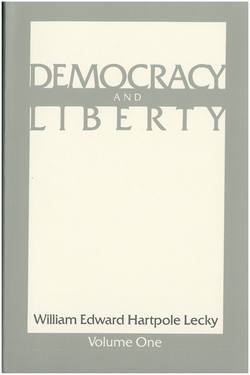Читать книгу Democracy and Liberty - William Edward Hartpole Lecky - Страница 8
На сайте Литреса книга снята с продажи.
ОглавлениеPREFACE
Many years ago, when I was deeply immersed in the History of England in the Eighteenth Century, I remember being struck by a struck by a saying of my old and illustrious friend, Mr. W. R. Greg, that he could not understand the state of mind of a mam who, when so many questions of burning and absorbing interest were rising around him, could devote the best years of his life to the study of a vanished past. I do not think the course I was then taking is incapable of defence. The history of the past is not without its uses in elucidating the politics of the present; and in an age and country in which politicians and reformers are abundantly numerous, it is not undesirable that a few men should persistently remain outside the arena. But the study of a period of history as recent as that with which I was occupied certainly does not tend to diminish political interests, and a write may be pardoned if he believes that it brings with it kinds of knowledge and methods of reasonning that may be of some use in the discussion of contemporary questions.
The present work deals with a large number of these questions, some of them lying in the very centre of party controversies. I had intended to introduce it with a few remarks on the advantage of such topics being occasionally discussed by writers who are wholly unconnected with practical politics, and who might therefore bring to them a more independent judgment and a more judicial temperament than could be easily found in active politicians. This preface I cannot now write. At a time when the greater portion of my book was already in the printers' hands an unexpected request, which I could not gratefully or graciously refuse, brought me into the circle of parliamentary life. But although my own position has been altered, I have not allowed this fact to alter the character of my book. While expressing strong opinions on many much-contested party questions, I have endeavoured to treat them with that perfect independence of judgment, without which a work of this kind can have no permanent value. Nor have I thought it necessary to cancel a passage in defence of university representation in general, and of the representation of Dublin University in particular, which was written when I had no idea that it could possibly be regarded as a defence of my own position.
One of the principal difficulties of a book dealing with the present aspects and tendencies of the political world in many different countries lies in the constant changes in the subjects that it treats. The task of the writer is often like that of a painter who is painting the ever-shifting scenery of the clouds. The great tendencies of the world alter slowly, but the balance of power in parliaments and constitutions is continually modified, and, under the incessant activity of modern legislation, large groups of subjects are constantly assuming new forms. I have endeavoured to follow these changes up to a very recent period; but in dealing with foreign countries this is sometimes a matter of no small difficulty, and I trust the reader will excuse me if I have not always altogether succeeded.
London: February, 1896.
